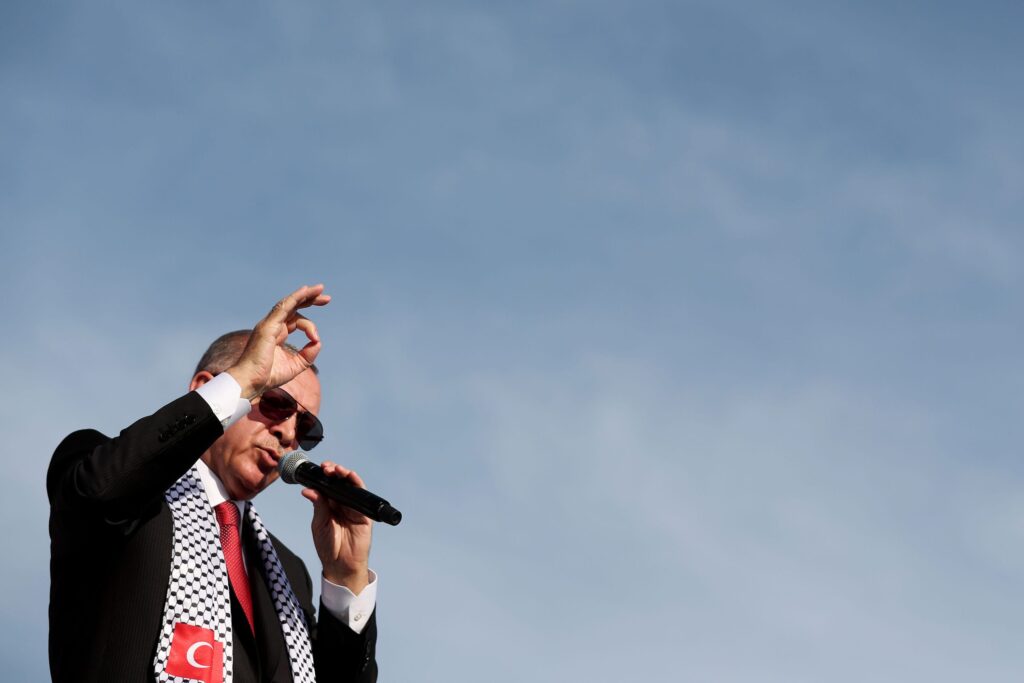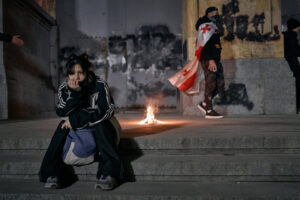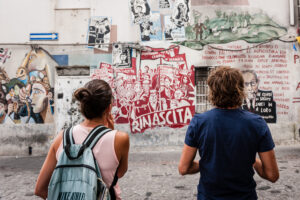From Crisis to Convergence
The Shifting Dynamics of Turkey's Political Arena

Turkish politics can be wildly unpredictable, and recent elections have been no exception.
President Recep Tayyip Erdogan was reelected last year despite long odds and serious gripes against his conservative Justice and Development Party (or AKP): a cost-of-living crisis, staggering levels of inflation, the public’s anger over what many saw as the government’s incompetent response to devastating earthquakes.
But then, this spring, the founding party of modern Turkey, the secularist Republican People’s Party (or CHP), which long predates the AKP, made an unexpected showing. In its best performance in almost half a century, the CHP won a plurality of votes in local elections, including in Istanbul, Ankara and other major cities—securing 37.77 percent, against 35.49 percent for the AKP. It beat the AKP in some of the ruling party’s strongholds, including in one province it had not won since 1946.
For some, the results inevitably raised major questions. After more than two decades of the AKP in power, what would Turkey’s foreign policy look like with another party at the helm? Is the CHP today the same as the hardline secularist CHP that was created a century ago at the founding of modern Turkey?
The CHP’s recent victory in conservative provinces seems to suggest that it has evolved far beyond its roots, partly in an attempt to appeal to religious conservatives. That surprise victory has also left many wondering about the fate of Erdogan’s increasingly assertive posture on foreign affairs: Would the CHP embrace aspects of his foreign policy, too?
The AKP has seemed emboldened recently. In October 2023, on the centenary of the founding of the Turkish Republic, Erdogan rolled out his vision for the next 100 years: the so-called Century of Türkiye. This new Turkey will be resilient to “external pressures.” It will challenge the prevailing liberal order. It will no longer be subservient to the West, which is declining and never fully embraced Turkey anyway. Turkey will finally take up its rightful place as a global power in an increasingly multipolar world.
This vision is grounded in geography, economic necessity—Western investors have become skittish—and grievance. Turkey’s leaders feel that for too long the West has taken them for granted and has used the country as a buffer on Europe’s periphery. In 2022, Suleyman Soylu, the interior minister at the time, delivered an impassioned speech: “After 2023, we will move so fast, the West will have to eat our dust.” Two decades earlier, the AKP had come to power with Western support and ambitions to eventually join the EU. But over the past decade, Erdogan has pursued a more autonomous, or more constructively ambiguous, foreign policy.
Part of the shift can be attributed to EU politics: Some member states have been wary of accepting into the union a country of Turkey’s size (and perhaps religion and politics), leading the AKP government to seek out allies elsewhere. The AKP also grew increasingly authoritarian during its first decade in power. It resented harsh criticism from the West over its violent response to the 2013 Gezi Park uprising, a protest movement against planned urban development in Istanbul. Gradually, populist anti-Western rhetoric became a staple of some AKP politicians’ public discourse.
This has left Turkey with a foreign policy that is often described as a balancing act. The country now hosts Hamas leaders while retaining commercial ties with Israel. It maintains good relations with Russia even as it supports Ukraine’s war effort and fights Russia-backed forces in Libya. It occupies Syrian territory under the pretext of fighting terrorism, but it clashes with the U.S. and NATO over the fate of the Kurds, who have been engaged in a decades-long insurgency for independence against the Turkish authorities. In the Balkans, Turkey supports NATO enlargement in its old backyard (drawing charges of “neo-Ottomanism” in the process); it provides the second-largest contingent of any country to the alliance’s peacekeeping force in Kosovo. It has increased its presence in Africa, boosting its humanitarian aid and education assistance and opening a large military base in Somalia.
The CHP, the main opposition since 2002, was founded by Mustafa Kemal Ataturk a century ago as the “party of the state.” Nominally social democratic, it was built on republicanism, nationalism, laicism and what some political scientists have described as “modernizing nationalism.” CHP supporters, or Kemalists, traditionally have come from the urban, educated, secular elite. Erdogan has called them “white Turks”—a pejorative phrase for the pro-Western, privileged middle class—while fashioning himself the champion of a moral regime of conservative Islamist “black Turks.”
But over the years, the CHP has tempered its ardent secularism. In 2008, then-party leader Deniz Baykal opted to allow women who wear headscarves to become party members. A so-called post-Kemalist period followed, in which CHP party leaders characterized Kemalism as a “dynamic” concept that included tolerance of religious diversity and acceptance of believers into their ranks. More recently, the CHP has actively courted Islamists, the AKP’s traditional base.
Despite the fundamental differences between the two parties, foreign affairs have long been a largely bipartisan issue in Turkey. Ihsan Dagi, an international relations professor at the Middle East Technical University, told me this was so because foreign policy belonged to “the realm of state affairs which necessitated unity.” But that changed with the so-called “one-minute incident” at Davos in 2009, when Erdogan stormed off the stage after being denied time to respond to Shimon Peres, Israel’s president, who had just defended at length his country’s recent assault on Gaza. Cheering throngs greeted Erdogan upon his return to Turkey. That moment essentially ended the bipartisan consensus, Dagi said: It “politicized Turkish foreign policy debates” and that has “effectively narrowed down the political space within which the CHP can take a position.”
Several issues appear in that narrow space today: immigration, interventionism and the conflicts in Gaza and Ukraine.
The AKP’s open-border policy toward Syrian refugees and generous assistance program have garnered praise abroad but provoked a nationalist backlash at home—including from the CHP. According to the UNHCR, the UN Refugee Agency, more than 3.1 million Syrian refugees were registered last month as living in Turkey. The AKP has taken a tolerant approach to them, partly on the basis of their shared religious identity, while CHP supporters have been more likely to view the refugees’ presence as a threat to the country’s secular culture and Turkishness.
More broadly, according to Selim Koru, an analyst at the Economic Policy Research Foundation of Turkey and a Templeton Fellow at the Foreign Policy Research Institute, CHP voters “generally don’t believe that Turkey should be invested in the conflicts of the Middle East.”
One exception is the war in Gaza. “There’s no major segment of the Turkish electorate that’s on the pro-Israeli side of this conflict,” Koru told me. And “the Palestinian question has been an exception to the anti-Arab sentiment of the CHP leadership and voters.” But that ostensibly shared position belies different sensibilities.
Many CHP voters view the Palestinian issue as a national liberation struggle, and leftists within the party have supported the Palestine Liberation Organization since the 1970s; Erdogan and his supporters view the issue as an Islamic cause and support Palestinians as a matter of Islamic solidarity. For AKP backers and other conservative Turkish Islamists, the Al-Aqsa Mosque in Jerusalem’s Old City is a symbol of Palestinian resistance. Erdogan has called for supporting Hamas and has hosted senior members of the group. But, Dagi said, secular CHP voters tend to be wary of Hamas and its Islamism. In April, the CHP mayor of Istanbul, Ekrem Imamoglu, called Hamas a “terrorist organization”—prompting harsh rebukes from members of the AKP, among others.
The war in Ukraine has exposed an additional difference, this time in the relationship between party leaders and their constituents.
The Turkish government has adopted a kind of studied neutrality about the war. Even as it has supplied Ukraine with drones and brokered a deal to resume the export of Ukrainian grain, it has maintained friendly relations with Russia. That balancing act, which Erdogan hopes will elevate Turkey to the status of constructive mediator, echoes popular sentiment across the political spectrum.
In an Aksoy Research poll published in March 2022, AKP and CHP voters were in near-total agreement on major issues. Some 76.7 percent of AKP voters and 76.4 percent of CHP voters said that Turkey should remain impartial in the conflict. And 20.2 percent of AKP voters said that Turkey should be on NATO’s side in the war, compared with 21.2 percent of CHP voters. “On the whole, the vast majority of voters in Turkey believe that NATO drew Russia into a trap and is bleeding it dry, and that the Ukrainians are suffering for it,” Koru said. The attitudes of CHP and AKP voters about the war in Ukraine “mostly differ in emphasis, not substance.”
Some members of the CHP, particularly the party’s elites, “will lay more of the blame on Russia, seeing in its leadership some of the elements they see in Erdogan (revisionism, civilizational thinking, ‘authoritarianism’),” Koru wrote in an email. Yet if the party’s older leadership supports the Atlanticist line, its younger voters tend to be NATO skeptics. The historian Candan Badem told me the newer generation of CHP supporters sees the conflict “as a proxy war between an aggressive NATO bloc against an oligarchic Russia.” Erdogan has tried to exploit this tension, Koru said, and may even “blow it out of proportion a bit,” the better to tar the CHP and tag it as being subservient to the West.
Overall, however, Dagi characterizes the CHP’s foreign policy less as a break from the foreign policy of the AKP than as “a more balanced continuation of it with slightly more pro-Western overtones.”
And that “slightly” keeps getting slighter.
Anti-Western sentiment has been growing across Turkey for some years now, a nationalist redirection of the country that has constrained even the CHP’s more Atlanticist elements. “The wars in Ukraine and Gaza didn’t mark big turning points,” according to Koru, “because Turkey actually went through this transformation pretty early.” For many Turks, the two conflicts have only confirmed “the idea that the West was hypocritical, couldn’t be trusted, and that the country needs to develop a long-term strategy that’s less and less dependent on its Western alliances.”
And then there is the perennial rallying power of national security. The CHP might oppose the ideological Islamist rationale of Erdogan’s foreign policy, and yet, Dagi said, it has generally backed military operations in Syria and Iraq that have been presented as countering possible Kurdish insurgencies. In recent elections the CHP has cooperated with the Peoples’ Democratic Party (or HDP), a largely Kurdish bloc. But Dagi called this a limited pragmatic partnership based on a common enemy: “When it comes to the demands of the Kurds for their cultural, social, and political rights, I do not see any understanding among CHP voters or the leadership, for that matter.”
In other words, CHP supporters are not nearly as pro-Western as Erdogan paints them or as many Western observers might hope. And the CHP itself has embraced a foreign policy that is only marginally more pro-Western than that of the AKP. Badem said he believes this is partly because of its perception that Turkey has been made to serve as the EU’s “first line of defense” against migrants. Koru also pointed out that Turkey’s 1974 invasion of Cyprus after a coup d’état by the Greek National Guard was carried out by a CHP government. What’s more, as Koru put it, “Turkey’s Kemalist elite also never managed to get integrated into Western elite circles, the way, say, the Greeks have been able to.”
And now, the two parties’ barely divergent positions on foreign policy actually seem to have converged further since the local elections in March.
The AKP has recently revised its approach to relations with Saudi Arabia and the United Arab Emirates, a form of “selective rapprochement” designed to attract much-needed foreign investment. It has also made gestures toward the United States. The CHP, for its part, has been increasingly muted in its criticisms of the AKP’s foreign policy. According to Dagi, this is because it hopes to win over the security establishment by projecting itself as a responsible opposition party that can work alongside the government when Turkey’s national interests are at stake.
This convergence confirms an established pattern. The CHP’s evolution during the AKP’s more than two decades in power reveals that it is a party willing to adapt its foundational principles. It has shed its fervent secularism and embraced ideas once antithetical to it. The CHP’s laicism was an antidote to Ottomanism and nationalism, a means of escaping the trappings of Empire. But today, despite its recent electoral successes, the party has yet to articulate an attractive alternative message on foreign policy that would distinguish it from the AKP’s increasingly global ambitions. Strategic ambiguity might appeal to a pragmatic security establishment, but it also leaves the CHP in a weak position: Erdogan has politicized foreign policy to his benefit in the past, and with the Century of Türkiye only just beginning, he looks poised to continue in the years ahead.


